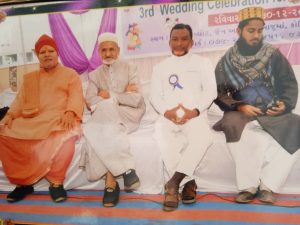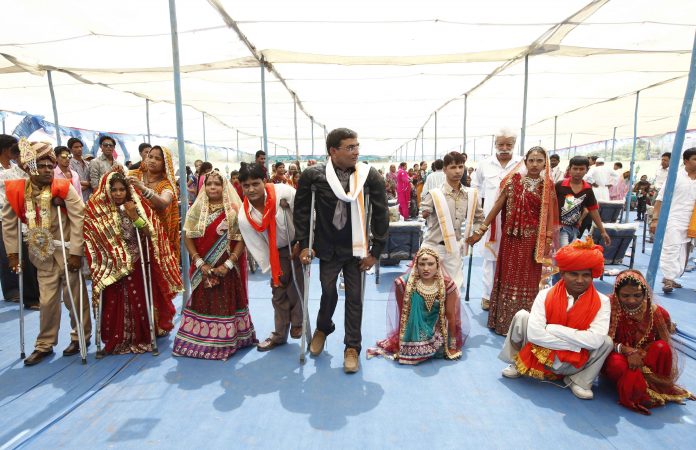Mahesh Trivedi, Twocircles.net
Differently-abled Ghulam Murtaza, better known as Babubhai, has a heart of gold. Both his legs are paralyzed and the middle-aged man walks with crutches and yet his spirit of kindness is stronger than the rest.
The small scale scrap dealer Murtaza, despite being physically challenged, always champions at lending a helping hand to others like him. No wonder, Rotary Club of Ahmedabad in Prime Minister Narendra Modi’s home state of Gujarat recently honored Murtaza with its prestigious Annual Vocational Award for exemplary social service.
The Good Samaritan’s most noteworthy service has been to organize every year, a one-of-its-kind, interfaith mass wedding ceremony for cash-strapped couples where both the bride and the groom are disabled and hail from different religions or communities. Rain or shine, for days on end, Babubhai frantically goes around the city on his weather-beaten, three-wheeler scooter, spotting economically struggling Hindu and Muslim youngsters wanting to tie the knot. He subsequently collaborates with philanthropists and priests who can voluntarily perform various religious rituals at marriage ceremonies.

“Each pair of these poor men and women gets household goods worth Rs 50,000 to start their new life”, says Babubhai who has been doing this for the past 32 years to bring smiles on the faces of such less fortunate souls. At such annual mass wedding ceremonies, the crippled, visually-impaired, deaf or mute beneficiaries – aged between 24 years and 42 years – found by Babubhai, come dressed in their Sunday best and are gifted a sofa set, a double bed, a steel cupboard, a kitchen set, a sewing machine, grains for one month and, of course, religious books after their marriage is solemnized.
Apart from orchestrating mass marriages for the needy, he also distributes essential food items among them at special occasions like Ramadan. And all of this, despite himself being no better economically. Last year’s Ramadan has remained etched in the memories of several such citizens of Muslim-dominated industrial locality of Vatva in Ahmedabad. Thanks to Vikalang Sahyak Kendra, a voluntary organization headed by Murtaza, that distributed Rs 500 cash and a food kit to some 250 disabled and penniless residents, most of them Muslims living nearby. The kit contained basic food items like rice, sugar, dates, custard, sherbet, wheat flour, gram flour, edible oil, tea leaves and chilli powder, just enough to last for a month.

Time and again, Babubhai also fixes up functions with the support of golden-hearted lawmakers and businessmen to hand over books, blankets, tricycles and self-employment kits to the poor leading a wretched life in the BJP-ruled Gujarat, infamous for one of the bloodiest communal clashes that had claimed 1,500 lives, mostly Muslims, in 2002.
“Because of tough documentation, government schemes for the differently-abled remain only on paper”, sighs Babubhai. Surprisingly, the Gujarat government has a scheme for providing financial aid for marriages of underprivileged classes but boasts no such facility for its handicapped citizens who are an unhappy lot.
“NGOs and other voluntary organizations receive millions of rupees and grants. But Babubhai has single-handedly done what they have not been able to achieve for years,” says industrialist Magan Patel, one of Babubhai’s handful of soft-hearted financial backers who always give him a leg up in his noble mission.
According to a 2018 NSO Survey, 2.21% of Indian population has one or the other kind of disability, which means 26.8 million people in India. Out of this, 23.8 per cent are included in the labour force, which again differs for different age groups and genders. While the literacy among the disabled in India is 19.3 per cent, it is easy to understand that they are groping in the dark for opportunities in addition to their already existing health issues.

“While any institute that is funded by the government must have a 3% representation by the disabled employee, this isn’t met compulsorily,” Babubhai explained, regarding employment of the disabled. He added that employment in the private sector had been growing at an increasing rate in the last two decades but representation of people with disabilities in the workforce was very low.
“Low literacy, few jobs and widespread social stigma are making disabled people among the most excluded in India,” says Babubhai, pointing out that the disabled employees contributed to a business’s diversity and competitive edge by offering fresh perspectives and ideas to accomplish tasks and implement strategies. He further opined that it was high time equal job opportunities were offered to people with disabilities which are at par with others on the basis of their skills and ability to perform the job. To contribute his own bit, the big-hearted Babubhai from Ahmedabad is now readying up an employment centre at his Vikalang Sahyak Kendra.


